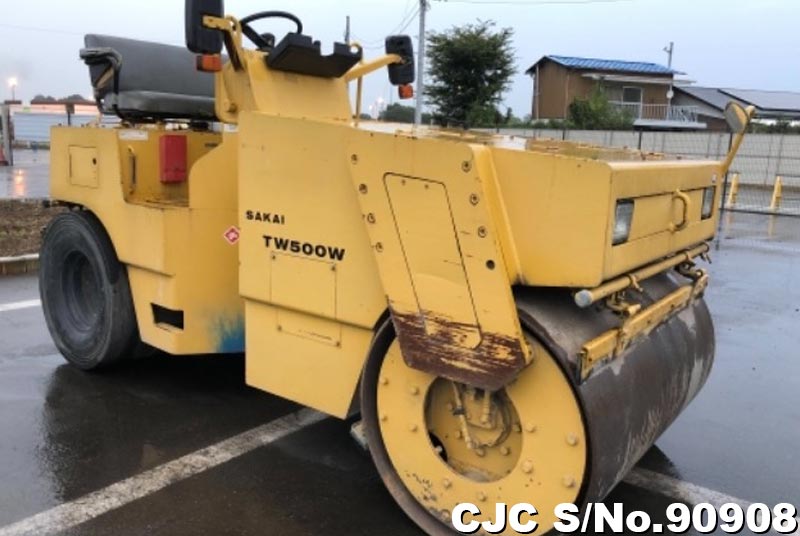Sakai Roller For Sale – The result is a society that increasingly prioritizes consumption over connection, profit over meaning, and exchange over understanding. From online platforms to local thrift stores, second-hand goods offer an opportunity for consumers to access unique products, save money, and reduce their environmental footprint. For people looking to furnish their homes, build a wardrobe, or invest in certain hobbies or collections, second-hand goods often provide a way to access items they might otherwise be unable to afford. Whether you’re the seller or the buyer, the phrase “for sale” is a reminder that everything in life is in constant motion, always moving toward something new, something different, something better. It may have been passed down, carefully preserved, and lovingly maintained. A well-maintained, quality leather jacket may last a lifetime, whereas a low-cost alternative might only hold up for a couple of seasons. Many high-quality products come with a rich history, whether it’s the legacy of a renowned brand or the personal touch of a local maker. The practice of buying and selling second-hand items has been around for centuries, but in recent years, it has seen a resurgence. Whether it’s the affordability, the environmental impact, or the opportunity to find unique items, second-hand goods provide an alternative to traditional retail shopping that is both practical and sustainable. These professionals help connect buyers with sellers, ensuring that both parties are well-informed and that the transaction process is as smooth as possible. The focus on longevity and reliability is what sets these goods apart from their mass-market counterparts. In some cases, sellers may be willing to offer financing options, where they agree to receive payment over time, which can make the business more attractive to potential buyers. For example, an old wooden chair might be sanded down and refinished into a modern piece of furniture, or a vintage dress might be altered to fit a contemporary style. With the rise of online platforms and a growing cultural shift toward sustainability, the second-hand market continues to thrive, providing consumers with more options and opportunities than ever before. For the buyer, there is the risk of inheriting a business with hidden problems or liabilities that were not disclosed during the due diligence process. The market for second-hand goods is also influenced by societal trends and economic conditions. The world of second-hand goods for sale is vast and varied, encompassing everything from clothing, electronics, and furniture, to books, antiques, and collectibles. The promise of success in a marketplace driven by capitalism can be an illusion for those who don’t have the resources or opportunities to compete on equal footing. These platforms provide a convenient way for sellers to connect with potential buyers, set their prices, and arrange for shipping or pick-up. For the seller, the goal is often to maximize the value of the business, while for the buyer, the focus is on ensuring that the investment is sound and that the business can continue to thrive under new ownership.

2010 Sakai SW6521 Tandem Asphalt Roller for Sale
Sign up for updatesin business since 1978financing availableregister online

Used Sakai R2S Road Roller For Sale in Indonesia
Sign up for updatesin business since 1978financing availableregister online

Used Sakai R2S Road Roller For Sale in Indonesia
Sign up for updatesin business since 1978financing availableregister online

Used Sakai TW500W Roller for sale 1996 model CJC 90908 Japanese
Sign up for updatesin business since 1978financing availableregister online

Sakai SV540D Single Drum Compaction Roller For Sale Compactor Rollers
Sign up for updatesin business since 1978financing availableregister online

Sakai SV414T Padfoot Roller Compactor For Sale Rollers Compactors
Sign up for updatesin business since 1978financing availableregister online

Used Sakai R2S Road Roller For Sale in Indonesia
Sign up for updatesin business since 1978financing availableregister online

Sakai SV540D Single Drum Compaction Roller For Sale Compactor Rollers
Sign up for updatesin business since 1978financing availableregister online

SAKAI SW900 Used Vibratory Compactor Roller Asphalt Roller For Sale
Sign up for updatesin business since 1978financing availableregister online

SAKAI SW900 Chilsonator Roller Compactor Used Asphalt Rollers For Sale
Sign up for updatesin business since 1978financing availableregister online
The global marketplace, with its constant buying and selling, influences everything from politics to the environment, creating ripple effects that are felt far beyond the immediate transaction. The idea that everything is for sale works to perpetuate inequality, as those with the most resources can continue to amass power and wealth, while others are left to scramble for what little they can get. In addition to individual sales, online marketplaces often feature businesses and professional sellers who specialize in second-hand goods, providing buyers with a curated selection of high-quality items. For sellers, online platforms can expand their reach to a global audience of potential buyers, increasing the chances of finding the right match for their business. What was once limited to boutique shops or high-end department stores can now be purchased from the comfort of one’s home. The most obvious benefit is the cost savings. Just as with material possessions, when a person is “for sale,” they put their value on display for others to assess. This shift in mindset has contributed to a growing acceptance and even celebration of second-hand shopping, making it a mainstream activity that is not just about saving money but about making more thoughtful and responsible choices. There are communities that exist outside the realm of traditional commerce, where sharing, collaboration, and mutual support take precedence over profit. The struggle is not in resisting the marketplace entirely, but in finding balance, in ensuring that the things that truly matter cannot be bought, sold, or traded. The materials, labor, and expertise that go into crafting these items naturally make them more expensive. Second-hand goods, especially those that are vintage or antique, often carry a sense of history and craftsmanship that can be missing from mass-produced products. Whether through thrift stores, flea markets, online platforms, or garage sales, second-hand goods provide consumers with an opportunity to find items they might not otherwise be able to afford, while also contributing to a circular economy where products are reused and repurposed. There is also a growing trend of online platforms that facilitate the buying and selling of businesses. This sense of history and individuality is part of what makes second-hand shopping so appealing. The result is a society that increasingly prioritizes consumption over connection, profit over meaning, and exchange over understanding. Quality goods for sale are not just limited to luxury items or high-end brands. The concept of quality, however, is not a one-size-fits-all. In conclusion, the market for second-hand goods for sale is an ever-growing and dynamic space that offers numerous benefits to both buyers and sellers. This creative process not only gives new life to old objects but also encourages people to think outside the box when it comes to the things they buy and use.
These concepts, they say, are too sacred, too important to be reduced to mere transactions. We live in a society where people constantly trade their time for money, their expertise for compensation, their dreams for tangible rewards. On one hand, there’s the potential for an established client base, proven systems, and a recognizably brand name. Millennials and Gen Z, in particular, have embraced the idea of second-hand shopping as a way to challenge consumerism, reduce waste, and express their individuality. For many, owning a quality product means owning a piece of history, a connection to something larger than themselves. It is only through diligent research that a buyer can truly determine whether the business is worth the asking price. At its core, “for sale” signifies that something is available for purchase, but beyond that, it tells a story of desire, exchange, and transition. This subjective nature of value is what makes the “for sale” market so dynamic. An item’s worth can be subjective, influenced by the desires, needs, and circumstances of both the seller and the buyer. These acts of generosity remind us that there are still things in life that cannot be bought, cannot be sold, and cannot be quantified. Many factors can influence the negotiation, such as the business’s financial performance, industry trends, and the level of interest from other buyers. While many artists and creators are forced to sell their work in order to make a living, there is still a sense of purity in the act of creation. One common concern is the risk of purchasing items that are damaged or not as described. One of the primary reasons people turn to second-hand goods for sale is financial. In some cases, it’s not just objects that are for sale, but entire industries or institutions. Social media platforms, for example, offer users a chance to buy into their own identity, to curate a version of themselves that is more appealing, more desirable, more marketable. For fashion-conscious individuals, buying second-hand is a way to express their personal style while also supporting sustainable practices. Many everyday products, such as kitchenware, footwear, and tools, can also be considered quality goods, provided they are made to last and perform well over time. This ensures that the product is fully functional and free of defects, providing peace of mind for buyers. Yet, despite this shift, the appeal of quality craftsmanship has not waned.